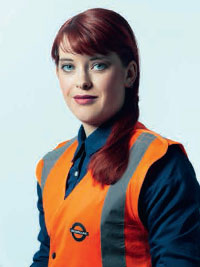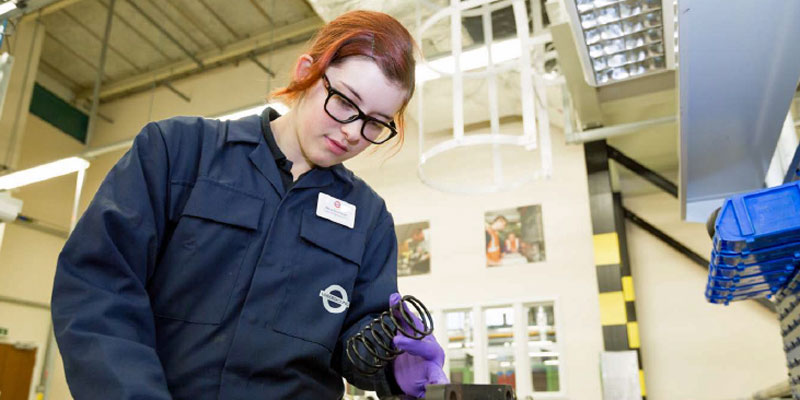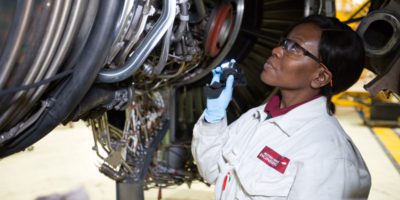Hanna Buckingham is a civil engineering apprentice at Transport for London (TfL). She joined in 2013 and spent the first year in TfL’s Apprenticeship Workshop, learning about five different elements of engineering, before rotating around different areas of the business on three to six month placements, learning on the job alongside her studies. Hanna is also a STEM champion, helping advise young people in schools and at careers events about the pathways open to them through engineering careers.

“…It’s just as important to decide you don’t want to do something as it is to decide you do want to do something…”
Engineering – a family thing
I don’t really know what made me want to get into engineering. I have engineering in the family – my grandfather was an aeronautical engineer and he also worked on trains when he was younger. My dad also worked with trains when he was younger, so I guess it’s a family thing!
Originally, I wanted to be an architect and looked at university, but it was about seven-odd years at university and I wasn’t sure if I was good at it, and I hadn’t had any chance to experience it.
I started to look at things which were similar and with civil engineering you can do design work, but you can get a bit more involved in the construction of it as well, and that interested me a bit more, so I looked into university for that. It was a lot shorter – about four years – but I decided that I still didn’t know if I was going to be any good at it because a lot of the time work experience in engineering can be quite hard to get hold of.
Experience through learning – the value of ‘try before you buy’
I decided to look at different routes and I saw that with apprenticeships you get to experience it by learning whilst you’re doing it, and that appealed to me a lot more. It’s sort of like ‘try before you buy’, where if you don’t like it you can leave after you’ve done the apprenticeship. You’re not tied to the company, whereas if you do a university course and you get halfway through and you decide you’re not good at it, you’re a bit stuck at that point.

We then moved on to electrical maintenance, which was wiring up buildings and safety when working with live electricity, and we did a safe isolation course as part of that. Then we moved on to mechanical maintenance. We got a compressor and took it to pieces, cleaned it, serviced it, put it back together (and tested it to make sure we’d put it back together properly).
Making something worth looking at
Next we moved on to bench fitting, which was working with mills and lathes to create different shaped pieces of metal. This was pretty cool because when I was at school I was awful at all those sorts of things! When they said to me: “You’re going to do all of this,” I just sat there and went, “…Yeah … OK… We’ll see how that goes..!” But they actually got me to make something that was worth looking at.
I take stuff that I made at that time to schools to show off what you do when you’re in the Apprentice Unit because it helps to solidify what we do when we’re there. It’s one thing to tell people what I do but it really helps if I can show them.
Three to six month-long placements
During the apprenticeship what you’re doing changes. We do three to six month placements and we move around the business. I’ve done placements with Track, where I’ve gone out patrolling and checking different track elements to make sure they meet the standards. I’ve also worked with signals going out and seeing how they lay their cables overnight and how all of the different signal systems work.
I’ve also gone out with Projects and been involved with some project work out there, replacing bridges and stuff like that. At the moment I’m doing inspections for the Civils Maintenance Team. I’ve also worked with Earth Works and I’ve worked with Drainage, where I did some design work. I’ve also modelled stations to see how much they would flood if a mains water pipe was to burst outside.
It’s really varied, especially in the civil engineering. I know a lot of other apprenticeships within TfL are a bit more specific, so with the ones where you’re in the depots, you’re confined to working in the depots. With the Track and Civil Engineering ones, they want you to experience a lot more. You move around the business and you have a lot of opportunity if you meet somebody and they say, “I’d like an apprentice to come and work with me,” you can go and work with them.
Not every apprenticeship is exactly the same. There’s a lot of scope for flexibility.
Working and learning – challenging but rewarding
The first year, for the Civil Engineering and the Advanced Track Technician (3 year) Apprenticeship at least, we spend four days a week in the workshop, and then one day a week at college doing a BTEC Level 3. The stuff you’re doing at the workshop is putting evidence towards your NVQ Level 3. Everybody does the same NVQ Level 3 – Engineering Technical Support – which will then help you if you want to go for the Engineering Technician qualification with the right institute. For me that would be the Institution of Civil Engineers, and I’m looking to do that this year.
Afterwards you do one day a week at college and then four days on placement, and then at the moment I’m being sponsored to go to university part time, so I do one day a week at university, four days a week placement.
When I first started university in the first term we only had half an hour break during the day from 9am-5pm because they were trying to fit everything in for us. It was the first year they were running the whole thing part time – usually they’ll do the first year, the Common Engineering Year, full time and then you can do part time after that, but for me, that wouldn’t work.
Apprenticeships that opens doors
A lot of people in high up managerial positions, have been, or started as, an apprentice, and it’s great because they mention that when they come and talk to us like when we had Phil Hufton (London Underground Chief Operating Officer now working at Network Rail) come and talk to us for our Apprentice Deeds evening – he started as a Track Apprentice. Even if they haven’t started as an Apprentice in our company, they might have started as an apprentice in a different company.
Our Head of Training Delivery started as an apprentice at one of the aeronautical engineering companies. I was talking to him about it. It gives you that foot in the door for you to be able to move on up through the company. They’re already trained you so they’ve given you the skills they want you to have, which is always useful.
You can even become Chartered without a degree. You have to have a lot of experience to demonstrate your worth, and it takes a lot more effort to do it that way. Most people don’t realise they can become Chartered or can get the Engineering Technician [status], simply by doing their day to day job.
Advice for girls and women considering apprenticeships
One of the things that I found useful – although I’d already made up my mind by this point – was to go to the Skills London event at the Excel Centre. (I helped out with it this year.) It’s not only apprenticeship providers who attend, but also universities, so you can decide what’s right for you because you can talk to the people who’ve either done it themselves or are trying to get you to join. They will tell you everything there is to know about it because they want you to go there.
If not, you can go to the Transport Museum. They hold a couple of events – I helped out with one where they get apprentices or graduates to come in and help you with interview skills and things like that. After they’d interviewed me they rated me on my interview, and they asked me a lot of questions about the apprenticeship, and because I was there I could give them advice. One of the girls said she was considering civil engineering because I’d talked to her about it. Previously she wasn’t sure what civil engineering was.
When I go out to schools to do talks and speed networking events, the first thing I’ll ask the kids is if they know what civil engineering is because it’s such as broad subject that not a lot of people know a lot about it. When I first started I didn’t know what it was about. Obviously I’m doing it now but I’m still learning new things about it all the time. That’s part of why I love it.
If you’re good at what you do, then you’ll be recognised for it, whether you’re male or female
It’s quite interesting. On my year I was one of three females out of 43 apprentices, so for some people it might be quite intimidating, especially as when I was on one of my placements I was shadowing a female engineer and when went into a meeting, we were the only two females in the room! The rest of it was all males.
I’m not that bothered about it because I was in Sea Cadets and Scouts when I was younger, and obviously there’s still a lot of male domination going on there as well, so I’m used to it by now. My dad brought me up to not really bother myself about it. If you’re good at what you do, then you’ll be recognised for it, especially now that it’s becoming more accepted to be working in this industry.
Being a STEM ambassador
It’s nice for people to want me to go and talk to young people as well, because often you don’t get women in the engineering industry, so they want me to go and talk to people and to encourage other women. It helps on your CV as well because you can talk about all this volunteering work that you’ve done to help young people – companies really like that.
The thing I enjoy most is the opportunity I get to go and talk to people, but I also do a lot of weird, fun things in my job as well – we recently did a birthday party for one of the stations (Maida Vale opened 100 years ago and was staffed entirely by women), and we sang happy birthday to it and we had a party with cake!

Last year I was involved in the successful Women in Engineering World Record attempt at Horse Guards Parade for the world’s largest high five.
I was also a panel member for the TfL Schools Challenge this year. It was good to see quite a few young women involved because I was in the audience the previous year it was a lot of young male students. It’s interesting to see that not only people that were doing engineering were joining this conversation, but also people from business and finance, and other commercial areas were also joining in with the challenge.
Future plans
I’m going to finish university. I’m on a Bachelors’ [Degree] at the moment, but I wanted to be on a Masters’ – hopefully I’ll prove to them that I’m good enough after this year. So that will be six to eight years’ time (which is a long time!). Once I’ve finished that I’ll hopefully be going for my Incorporated Engineer Status from the Institution of Civil Engineers and move on to being a Chartered Engineer. I want to end up in project management, but we’ll see how that goes..!
If I hadn’t gone for the apprenticeship, I wouldn’t have been thinking of this plan. It’s introduced me to all these different things that I could do, so I started thinking: “These people are enjoying their jobs, so maybe I could do that one day.” It really helped me decide where I wanted to be because I was able to shadow project engineers and project managers, so I got to see what they do and to decide I’d like to do that myself.
It’s just as important to decide you don’t want to do something as it is to decide you do want to do something, because then when you have the choice between one thing and another and you already know you don’t want to do one of them it pretty well makes your mind up for you.
https://tfl.gov.uk/corporate/careers/apprenticeships
https://tfl.gov.uk/campaign/100-years-of-women-in-transport
https://instagram.com/transportwmn





